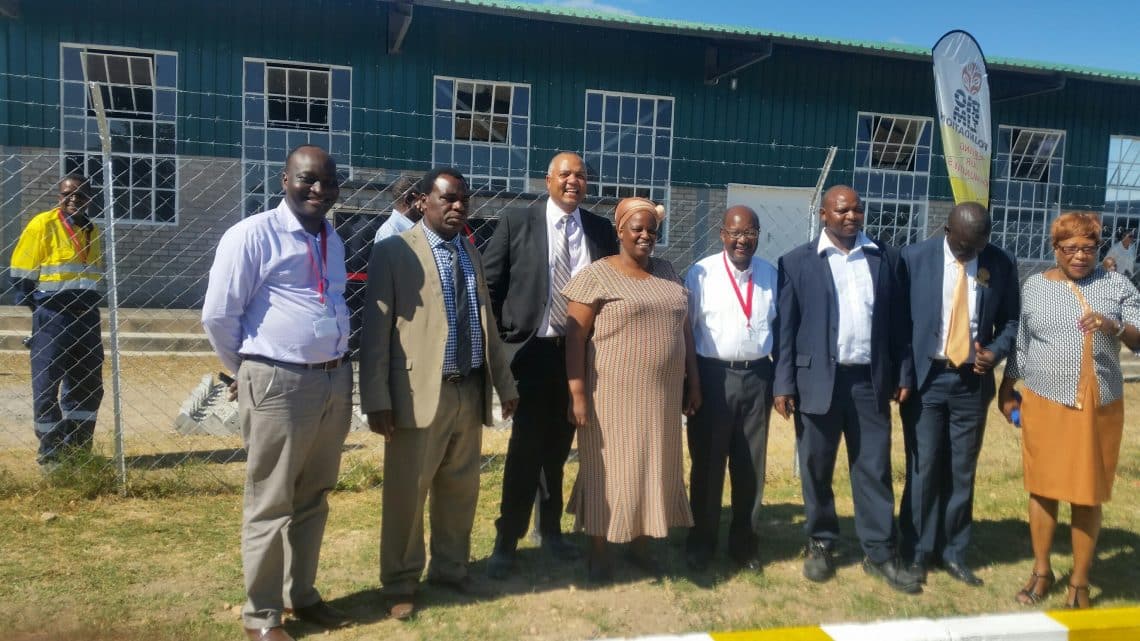By Byron Mutingwende
It is often said mining companies do more harm to the communities they operate in than any good but this is not the case for Murowa Diamond which operates in Zvishavane in the Midlands Province.
Located in the Mazvihwa area, some 70km from the mining town of Zvishavane, Murowa Diamond has brought considerable progress to the previously remote and hard to reach area. In the recent past, one would enjoy the 40km-tarred stretch of the road from Zvishavane to the Mazvihwa turnoff only to endure the bumpy, dusty and potholed trip to the mine.
Murowa Diamond has rehabilitated the dusty road and on the 6th of June 2017, the mine handed over the new Jimu Bridge, the Baradzamwa borehole, water reticulation and electrification infrastructure.
Speaking at the official handover ceremony of Murowa Diamonds Community Projects during the visit of the Parliamentary Portfolio Committee on Mines and Energy, RioZim Board Chairman, Mr Lovemore Chihota said the company was commissioning factory shells at Murowa Business Centre, Mhike Bridge, e-learning centre at Baradzanwa Primary School, the rehabilitated community main road, announcement of bursary scheme for 2018 school year and education aid to schools in the community.
“RioZim Foundation has a rich history of social economic development initiatives. We currently have a number of projects running our various units. We commit to ensuring that we remain an active development partner not only in Mazvihwa area but the whole of Zimbabwe,” Chihota said.
The veteran technocrat said the company’s projects should pass the sustainability test and should continue even long after its departure from the area.
Among the six distinct projects launched are the two factory shells at Murowa Business Centre, the only second such structure in the country after a similar one in Chitungwiza.
To date Murowa has equipped two bays of the shells – one for hot works and the second one for garment making and sewing.
“Training will be a requisite for beneficiaries (community youth and women) and to that end we have partnered with the Zvishavane Vocational Training Centre who will ensure certification of all students.
“Graduates will receive a starter pack as our support for them to establish their own businesses. This is sustainable empowerment at its best. Few years down the line we expect to see graduates producing carts, window frames, uniforms, clothing and these same centres will become manufacturing hubs for serving the community and beyond,” said Wilson Gwatiringa, the RioZim Corporate Affairs Executive.
The factory shells speak to the national priority of job creation and economic empowerment of communities and will serve as an incubator for nurturing upcoming entrepreneurs.
The company also handed over the massive Mhike Bridge that was constructed to address the problem of accessibility. Previously, every year, the Mazvihwa area was not passable during the many months of the rainy season due to flooding and accumulation of sand. It emerged that 160 jobs were created mostly from the local community during the construction of the bridge.
Education is a priority for RioZim Foundation. To that effect, the company set up an e-learning centre at Baradzanwa School.
In a separate interview, Temba Mliswa, the chairman of the Parliamentary Portfolio Committee on Mines and Energy hailed the company for providing the e-learning centre, water and electricity as well as building three classroom blocks at the school.
“The e-learning centre will go a long way in helping the school to meet the requirements of the new curriculum. We encourage school authorities to embrace other children from surrounding schools,” Mliswa said.
The hardworking legislator said the mining companies should prioritise the environmental and social wellbeing of the communities that was more important than any business ventures. He encouraged miners to listen to the concerns of community members especially around complaints that some houses were falling or disintegrating because of blasting from mining.
In 2018, RioZim introduced a business bursary that will benefit 120 pupils at secondary and tertiary levels. After realising that some families of students in the schools could not afford exercise books, pens, pencils and related stationery, the company introduced the Education Aid and Support to Schools project. Murowa Diamond is providing more than adequate quantities of the stationery.
RioZim’s involvement in Murowa Diamond started in 2015 when it took over from RioTinto that had stopped mining in that year.
Bheki Nkomo, the RioZim Chief Executive Officer, in his briefing to the Parliamentary Portfolio Committee indicated that the company invested $45 million into the company and was able to get a three-and-a-half years extension of the life of the mine after RioTinto had stopped mining.
“Production in terms of carats grew by over 300% from 252 000 carats per year under RioTinto to 759 000 carats in 2017. We are looking to produce above 1, 1 million carats in 2018. That will represent a growth of 500% in under three years. As a result of this, Murowa has been able to contribute immensely to the much needed foreign currency earnings of this country,” Nkomo said.
The local traditional leaders, Chiefs Mapanzure and Mazvihwa paid tribute to Murowa diamond for bringing tangible development to the area under their jurisdictions.
